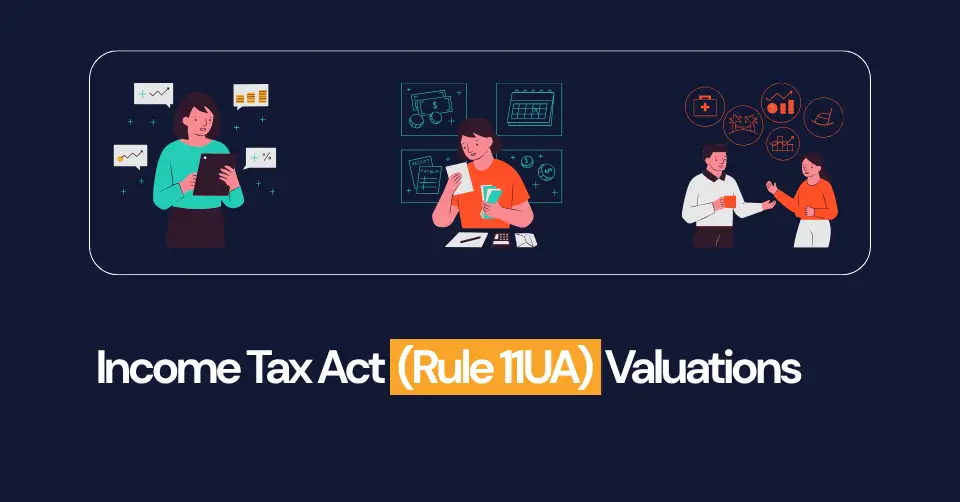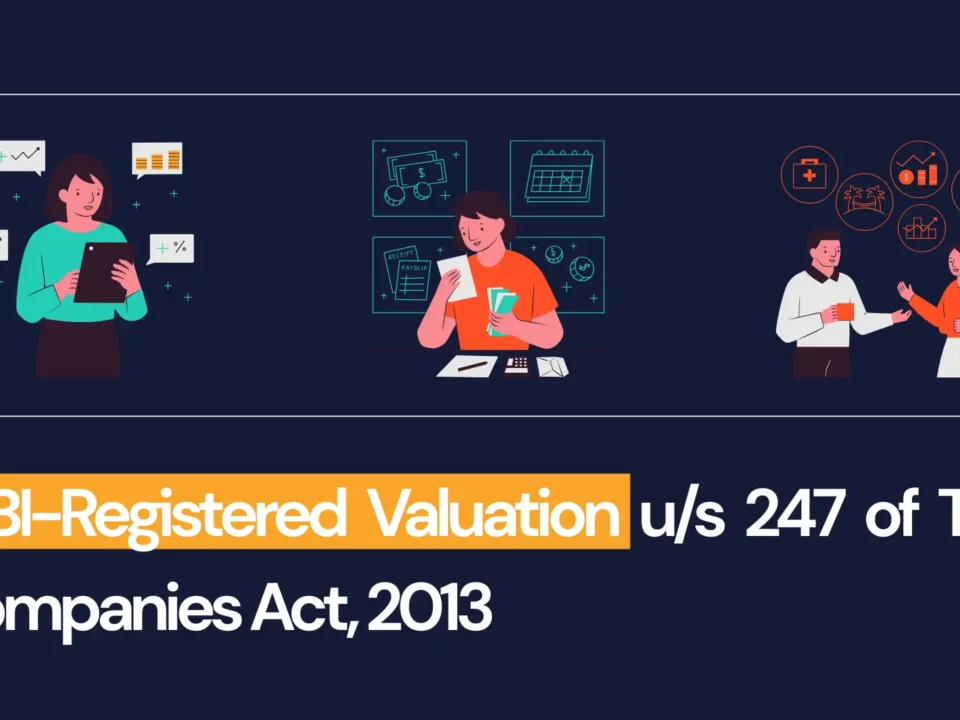
IBBI-Registered Valuation u/s 247 of The companies Act, 2013
October 8, 2025
Valuation for FEMA / FDI Compliance | Equirium
October 9, 2025Table of contents
- Accurate & Compliant Fair Market Value (FMV) Reports under Section 56(2)(viib)
- Understanding Rule 11UA under Income Tax Act, 1961
- When is Rule 11UA Valuation Required ?
- Methods of Valuation under Rule 11UA
- Documents Required for Rule 11UA Valuation
- Why Rule 11UA Valuation Matters
- How Equirium Analytics Assists You
- Why Choose Equirium Analytics
Accurate & Compliant Fair Market Value (FMV) Reports under Section 56(2)(viib)
This valuation ensures compliance with the Income Tax Act, 1961, and helps businesses justify the pricing of shares issued to investors, founders, or employees. At Equirium Analytics, our team of IBBI-Registered Valuers prepares tax-compliant, defensible valuation reports that meet the standards prescribed by law - helping startups, private companies, and investors avoid potential tax litigation and scrutiny.
Understanding Rule 11UA under Income Tax Act, 1961
Rule 11UA defines the methodology to determine FMV for various classes of assets, particularly unquoted equity shares, which do not have an active market price.
It is primarily used in the context of Section 56(2)(viib) of the Income Tax Act, which aims to curb tax evasion arising from share premium received above fair market value.
In simpler terms — whenever a company issues shares at a premium, the tax department may question the valuation.
A Rule 11UA-compliant valuation report provides the defensible evidence that the premium is justified based on financial and business fundamentals.
When is Rule 11UA Valuation Required ?
Valuation under Rule 11UA is required in multiple circumstances, including:
-
Issue of Shares at Premium: When unlisted companies issue shares to investors or promoters.
-
Fundraising by Startups: Mandatory for DPIIT-recognized startups or others raising capital from angel investors.
-
ESOPs and Employee Buybacks: To determine FMV of shares for employee taxation and accounting.
-
Share Transfers: During intra-group transactions, mergers, or acquisitions involving unlisted shares.
-
Convertible Instruments: For conversion of preference shares, debentures, or other hybrid securities.
-
Tax Filings & Assessments: Required for defending valuation positions before the Income Tax Department.
Essentially, any transaction involving unlisted shares that could trigger taxation under Section 56 or 50CA requires a Rule 11UA-compliant valuation.
Methods of Valuation under Rule 11UA
The Rule 11UA prescribes two accepted methods for valuing unquoted equity shares:
1. Net Asset Value (NAV) Method
A balance-sheet-based approach that determines the value per share based on the company’s assets minus liabilities.
Best suited for asset-heavy or mature businesses with stable operations.
Key Inputs:
-
Latest audited balance sheet
-
Adjusted book values of assets and liabilities
-
Paid-up share capital and reserves
2. Discounted Cash Flow (DCF) Method
A forward-looking valuation approach that estimates the company’s value based on projected cash flows and the time value of money.
Preferred for startups and growth-stage companies that derive value from future potential rather than current assets.
Key Inputs:
-
3-5 years of financial projections
-
Business assumptions and market drivers
-
Discount rate (Weighted Average Cost of Capital – WACC)
-
Terminal value estimation
At Equirium Analytics, our experts apply rigorous financial modeling and sensitivity testing to ensure the DCF analysis aligns with the valuation principles prescribed by Rule 11UA.
Documents Required for Rule 11UA Valuation
To ensure accuracy and regulatory compliance, we generally require:
-
Latest audited and management financial statements
-
Detailed shareholding pattern
-
Future financial projections (for DCF method)
-
Business plan, market analysis, and investor pitch deck (if applicable)
-
Incorporation certificate, PAN, and CIN
-
Details of proposed share issue or transaction
Our team ensures confidentiality and clarity throughout the process — from information collection to report delivery.
Why Rule 11UA Valuation Matters
-
Regulatory Compliance: Satisfies requirements under Section 56(2)(viib) and avoids taxation on excess share premium.
-
Tax Audit Defense: Provides a strong defense in case of scrutiny or assessment proceedings.
-
Investor Confidence: Adds transparency and credibility to your fundraising and reporting process.
-
Alignment with FEMA Valuation: Often used as a parallel reference for cross-border or FDI transactions.
-
Reduced Litigation Risk: Ensures documentation and rationale are in line with CBDT guidelines.
How Equirium Analytics Assists You
-
As an IBBI Registered Valuer for Securities and Financial Assets, we bring both regulatory knowledge and valuation expertise to every engagement.
Our Approach:
-
Detailed assessment of the business model and financial performance
-
Selection of the most appropriate valuation methodology (NAV or DCF)
-
Preparation of robust financial models and supporting schedules
-
Drafting of comprehensive valuation report in accordance with IBBI and Income Tax guidelines
-
Consultation and explanation to auditors, investors, or tax authorities if needed
-
Why Choose Equirium Analytics
-
You can display this section in your signature dark color (#121935) with light text:
IBBI Registered Valuer with specialized expertise in Securities & Financial Assets
Compliant & Defensible Reports aligned with Income Tax and CBDT requirements
In-depth Financial Modeling Support ensuring transparency and traceability
Quick Turnaround & Personalized Support for startups and corporates
Trusted by Leading Law Firms, Startups & Investors for valuation assurance




